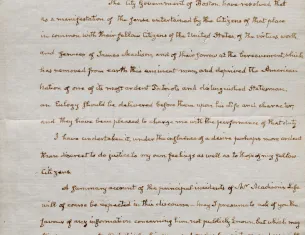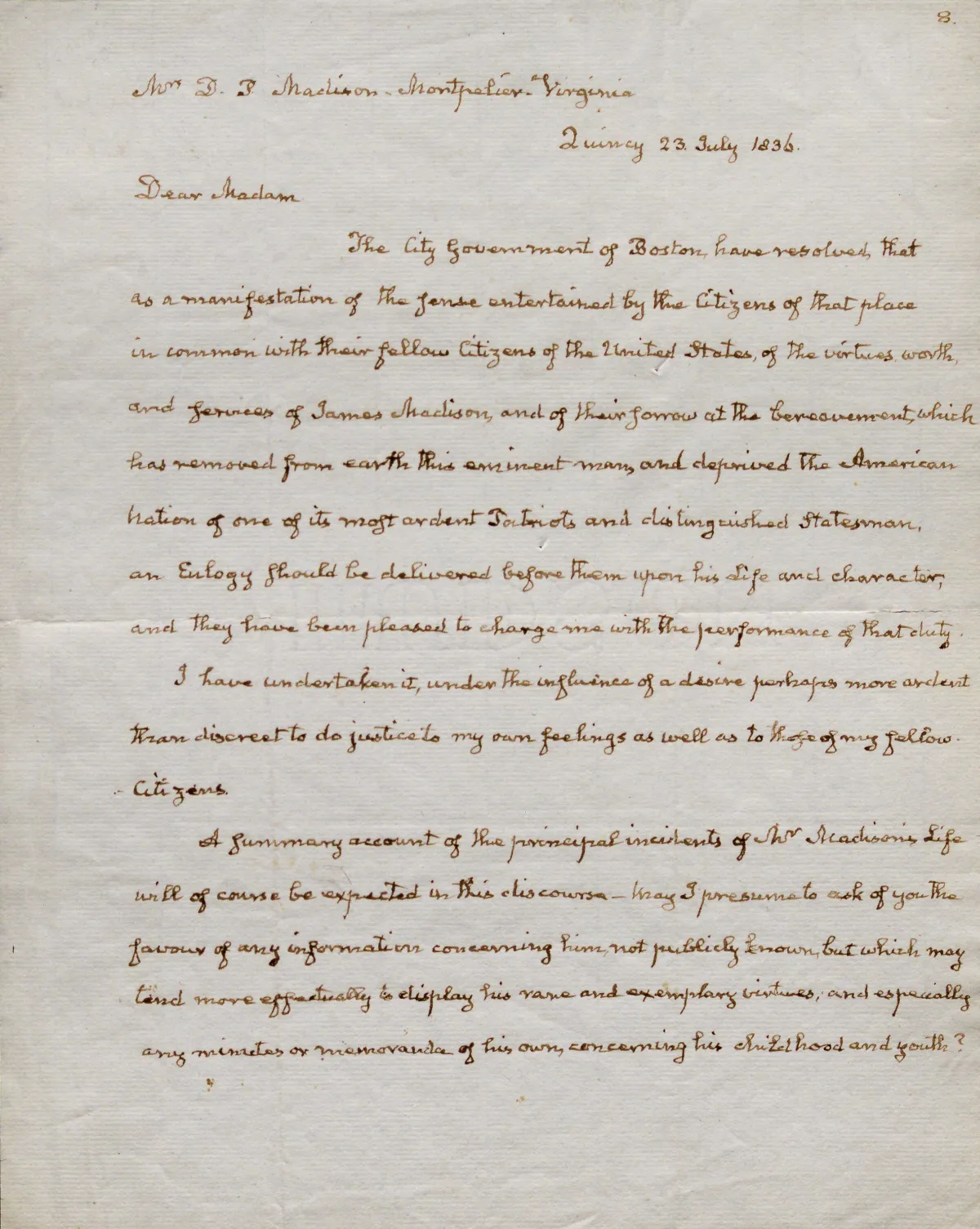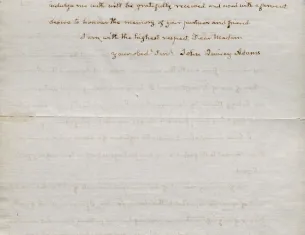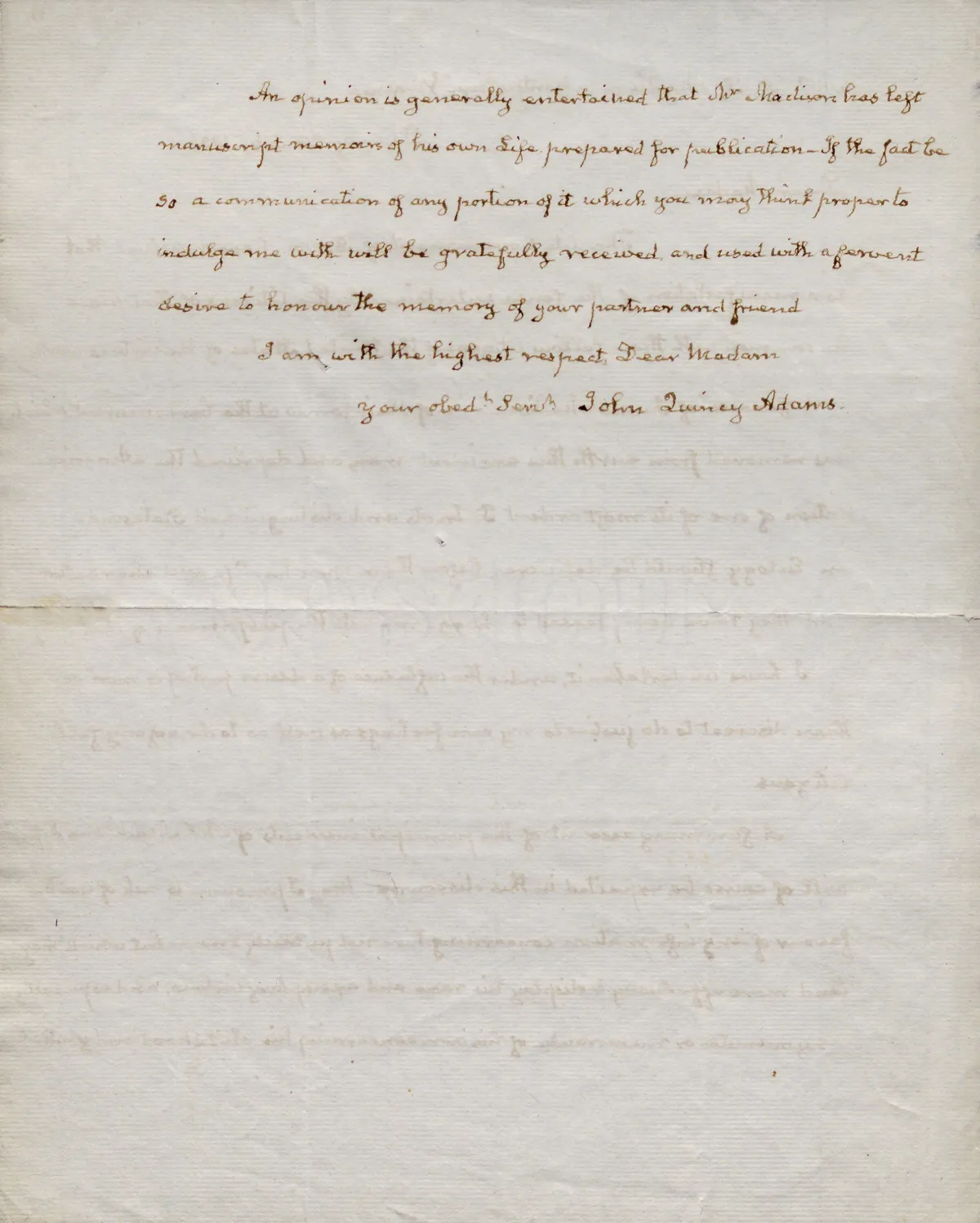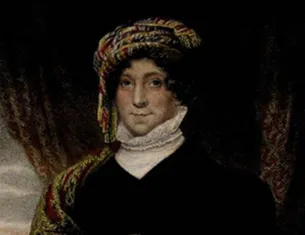John Quincy Adams on the Eulogy for James Madison, 1836
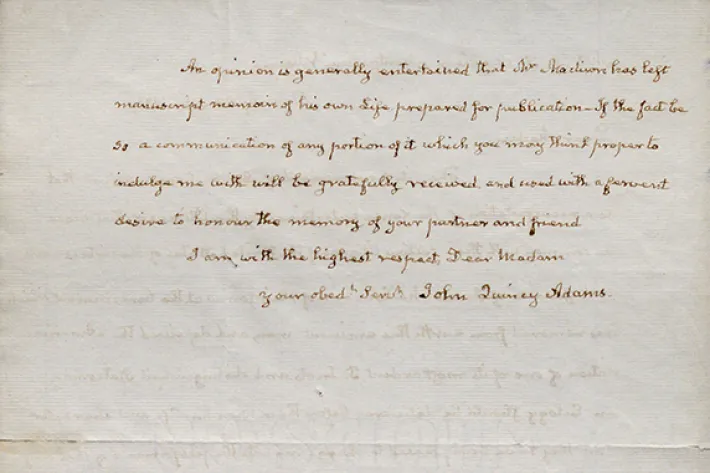
John Quincy Adams to Dolley Madison, July 23, 1836. (The Gilder Lehrman Institute of American History)
When Founding Father and President James Madison died in 1836, John Quincy Adams began to draft a eulogy for him to be delivered in Boston. Hoping to include anecdotes of Madison’s early life, Adams wrote to Madison’s widow Dolley, asking for her recollections and, if possible, access to her late husband’s manuscript memoirs.
A Letter from John Quincy Adams to Dolley Madison, July 23, 1836
Mrs D. P. Madison – Montpelier, Virginia
Quincy 23. July 1836.
Dear Madam
The City Government of Boston have resolved, that as a manifestation of the sense entertained by the Citizens of that place in common with their fellow Citizens of the United States, of the virtues, worth, and services of James Madison, and of their sorrow at the bereavement, which has removed from earth this eminent man, and deprived the American Nation of one of its most ardent Patriots and distinguished Statesman, an Eulogy Should be delivered before them upon his Life and character, and they have been pleased to charge me with the performance of that duty.
I have undertaken it, under the influence of a desire perhaps more ardent than discreet to do justice to my own feelings as well as to those of my fellow Citizens.
A Summary account of the principle incidents of Mr Madison’s Life will of course be expected in this discourse – May I presume to ask you the favour of any information concerning him, not publicly known, but which may tend more effectually to display his rare and exemplary virtues; and especially any minutes or memoranda of his own, concerning his childhood and youth?
An opinion is generally entertained that Mr Madison has left manuscript memoirs of his own Life prepared for publication – If the fact be so a communication of any portion of it which you may think proper to indulge me with will be gratefully received, and used with a fervent desire to honour the memory of your partner and friend.
I am with the highest respect, Dear Madam
your obedt. Servt. John Quincy Adams.
Source: John Quincy Adams to Dolley Madison, July 23, 1836, The Gilder Lehrman Institute of American History, GLC00639.04.
A Letter from John Quincy Adams to Dolley Madison, July 23, 1836
MrsD. P. Madison – Montpelier, Virginia
Quincy 23. July 1836.
Dear Madam
The City Government of Boston have resolved, that as a manifestation of the sense entertained by the Citizens of that place in common with their fellow Citizens of the United States, of the virtues, worth, and services of James Madison, and of their sorrow at the bereavement, which has removed from earth this eminent man, and deprived the American Nation of one of its most ardent Patriots and distinguished Statesman, an Eulogy Should be delivered before them upon his Life and character, and they have been pleased to charge me with the performance of that duty.
I have undertaken it, under the influence of a desire perhaps more ardent than discreet to do justice to my own feelings as well as to those of my fellow Citizens.
A Summary account of the principle incidents of MrMadison’s Life will of course be expected in this discourse – May I presume to ask you the favour of any information concerning him, not publicly known, but which may tend more effectually to display his rare and exemplary virtues; and especially any minutes or memoranda of his own, concerning his childhood and youth?
An opinion is generally entertained that MrMadison has left manuscript memoirs of his own Life prepared for publication – If the fact be so a communication of any portion of it which you may think proper to indulge me with will be gratefully received, and used with a fervent desire to honour the memory of your partner and friend.
I am with the highest respect, Dear Madam
your obedt.Servt. John Quincy Adams.
Source: John Quincy Adams to Dolley Madison, July 23, 1836, The Gilder Lehrman Institute of American History, GLC00639.04.
manifestation - display
bereavement - loss
eminent - famous and important
ardent - emotional
Background
When Founding Father and President James Madison died in 1836, John Quincy Adams began to draft a eulogy for him to be delivered in Boston. Hoping to include anecdotes of Madison’s early life, Adams wrote to Madison’s widow Dolley, asking for her recollections and, if possible, access to her late husband’s manuscript memoirs.
Transcript
A Letter from John Quincy Adams to Dolley Madison, July 23, 1836
Mrs D. P. Madison – Montpelier, Virginia
Quincy 23. July 1836.
Dear Madam
The City Government of Boston have resolved, that as a manifestation of the sense entertained by the Citizens of that place in common with their fellow Citizens of the United States, of the virtues, worth, and services of James Madison, and of their sorrow at the bereavement, which has removed from earth this eminent man, and deprived the American Nation of one of its most ardent Patriots and distinguished Statesman, an Eulogy Should be delivered before them upon his Life and character, and they have been pleased to charge me with the performance of that duty.
I have undertaken it, under the influence of a desire perhaps more ardent than discreet to do justice to my own feelings as well as to those of my fellow Citizens.
A Summary account of the principle incidents of Mr Madison’s Life will of course be expected in this discourse – May I presume to ask you the favour of any information concerning him, not publicly known, but which may tend more effectually to display his rare and exemplary virtues; and especially any minutes or memoranda of his own, concerning his childhood and youth?
An opinion is generally entertained that Mr Madison has left manuscript memoirs of his own Life prepared for publication – If the fact be so a communication of any portion of it which you may think proper to indulge me with will be gratefully received, and used with a fervent desire to honour the memory of your partner and friend.
I am with the highest respect, Dear Madam
your obedt. Servt. John Quincy Adams.
Source: John Quincy Adams to Dolley Madison, July 23, 1836, The Gilder Lehrman Institute of American History, GLC00639.04.
Excerpt
A Letter from John Quincy Adams to Dolley Madison, July 23, 1836
MrsD. P. Madison – Montpelier, Virginia
Quincy 23. July 1836.
Dear Madam
The City Government of Boston have resolved, that as a manifestation of the sense entertained by the Citizens of that place in common with their fellow Citizens of the United States, of the virtues, worth, and services of James Madison, and of their sorrow at the bereavement, which has removed from earth this eminent man, and deprived the American Nation of one of its most ardent Patriots and distinguished Statesman, an Eulogy Should be delivered before them upon his Life and character, and they have been pleased to charge me with the performance of that duty.
I have undertaken it, under the influence of a desire perhaps more ardent than discreet to do justice to my own feelings as well as to those of my fellow Citizens.
A Summary account of the principle incidents of MrMadison’s Life will of course be expected in this discourse – May I presume to ask you the favour of any information concerning him, not publicly known, but which may tend more effectually to display his rare and exemplary virtues; and especially any minutes or memoranda of his own, concerning his childhood and youth?
An opinion is generally entertained that MrMadison has left manuscript memoirs of his own Life prepared for publication – If the fact be so a communication of any portion of it which you may think proper to indulge me with will be gratefully received, and used with a fervent desire to honour the memory of your partner and friend.
I am with the highest respect, Dear Madam
your obedt.Servt. John Quincy Adams.
Source: John Quincy Adams to Dolley Madison, July 23, 1836, The Gilder Lehrman Institute of American History, GLC00639.04.
manifestation - display
bereavement - loss
eminent - famous and important
ardent - emotional
